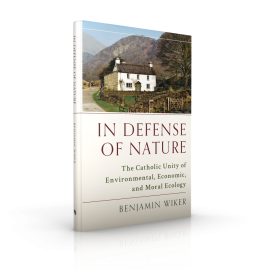By Benjamin Wiker
Benjamin Wiker is a professor of Political Science and Director of Human Life Studies at Franciscan University of Steubenville. He is the author of In Defense of Nature: The Catholic Unity of Environmental, Economic, and Moral Ecology.

If we have become increasingly abstracted from nature, both in our daily screen-saturated life and in the very science of biology, then it would seem very likely that we’ve become similarly abstracted from human nature. Immersed in our virtual world, we have lost our own nature and have thereby become increasingly dehumanized.
Once we defined ourselves as entirely material, pleasure-seeking creatures with nothing to live for but maximizing our bodily pleasures and minimizing our pains through technological mastery of nature, we began to see nature as something to be manipulated for the sake of this hedonistic goal rather than a wonder-full order with its own complex integrity that must be studied and respected.
But of course, the same thing happened to our own nature. Given our Baconian utilitarian goal, we began to see human nature as something to be manipulated for the sake of this hedonistic goal, rather than a wonder-full order with its own complex integrity that must be respected.
Our super-destructive addiction to Internet pornography is only the most obvious example of our embrace of the most intense, individual sensual pleasure, one that pollutes our human sexual nature and the sexual nature of others by treating them as raw material for our ever more raw obsessions—as if we, among all the animals, could do whatever we wanted with sexuality, regardless of the intrinsic biological and moral realities of our nature. We are increasingly absorbed into screen sex, and don’t care what happens, no matter how destructive to nature, to ourselves, or to anyone else.
We must therefore think about the obvious—and here I am aware that I’m now goading the Left just as hard as I was previously goading the Right in regard to environmental pollution. If we can’t do whatever we want for our own private pleasure in regard to the natural environment, in regard to the water, the forests, the atmosphere, the fields, or in regard to other species—whether cuttlefish or caribou, woodpeckers or salmon—how can it be that we believe that we should be able to do whatever we want with our own sexual nature? Isn’t our own human sexuality part of our ecology? Isn’t human sexual nature part of nature? Isn’t a non-toxic cultural environment devoid of sex pollution the most healthy environment?
If we, in virtue of being at the top of the biological pyramid, have a moral duty to take care of the natural world—the rest of the pyramid, upon which we depend— don’t we have a moral duty to care for the integrity of our own sexual nature?
But we can’t and won’t if—as has become the case in regard to nature in general over the last few decades— we’ve become increasingly abstracted from our own sexual nature. As with our abstraction from the natural world, we can’t rediscover our own sexual nature if our attitude is “we want what we want and damn the consequences.”
This is not a mere negative shaming, but an invitation to discovery. As with recovering our proper wonder at the natural world, we also might discover—if we could turn our attention to our sexual nature, rather than turn to pornography for its manipulation—that it is also wonder-full.
I begin with the obvious: male and female are natural distinctions. We are animals defined fundamentally by our capacities to procreate, but that is nothing peculiar to human beings. So is just about every other creeping, crawling, running, flying, swimming creature out there. Biologically, reproduction is an essential part of animal nature. That’s how it is throughout nature. How could it be otherwise with us?
But we have become masters of manipulation of our reproductive biology, our sexuality, even our gender. The beginning of our abstraction from our sexual nature was not Internet porn. As I indicated above, it was the development of the Pill because—true to its Baconian inspiration of mastering nature for the sake of pleasure—it technologically cut sexual pleasure from its natural biological aim in the same way that we’ve removed sweetness from actual health-giving food. It did so not just for the individuals involved, but for our society.
We have some serious questions to ask ourselves. How have we become so abstracted from our biological nature at the most rudimentary level that we believe that male and female are optional biological categories for us, especially when we, as students of nature, don’t treat any other animal that way? How could male and female be optional for the human animal alone, and moreover, subject to endless Baconian hedonistic and technological manipulation?
It isn’t all about sex, I remind the reader. The same continual saturation in virtual reality that is killing our sexual nature is killing our social nature, as just noted. But it’s also killing our rational nature because we are too frittered by screen absorption to think deeply about anything, including, especially, the beautiful order of nature. That’s an unpleasantly comprehensive ruination of our human nature, a real pollution destroying what we should be. And again, if we pollute ourselves, why should we care whether we pollute the environment?
You Might Also Like

Ecology calls to mind nature “out there”—trees, rivers, oceans, animals, birds, the air, distinct ecosystems. But as Benjamin Wiker argues in his book In Defense of Nature, an obvious part of nature has been mysteriously left out of the environmental movement: our own nature—human nature, especially its essential moral aspects.